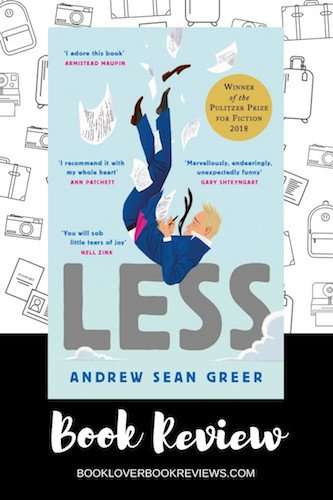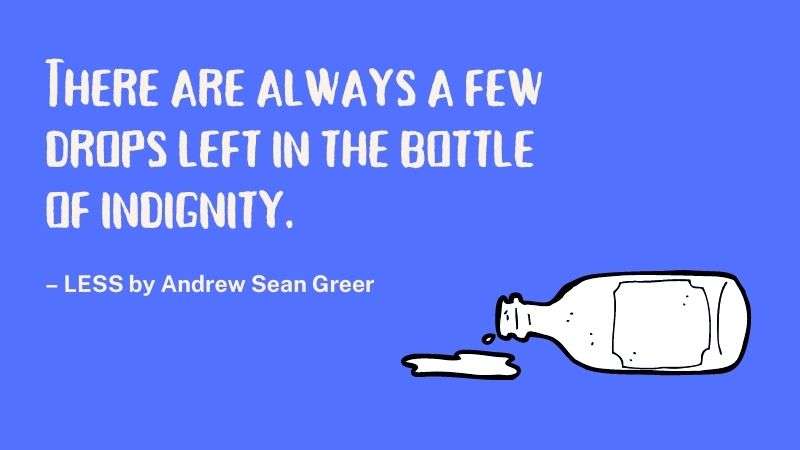Less (a Novel) by Andrew Sean Greer: Uncommon narrative
Less (a Novel) by Andrew Sean Greer is a life-affirming story about the writing life that I highly recommend to those with strong literary leanings. Read my review.
Less Book Synopsis

WHO SAYS YOU CAN’T RUN AWAY FROM YOUR PROBLEMS?
Arthur Less is a failed novelist about to turn fifty. A wedding invitation arrives in the post from an ex-boyfriend of nine years who is engaged to someone else. Arthur can’t say yes – it would be too awkward; he can’t say no – it would look like defeat. So, he begins to accept the invitations on his desk to half-baked literary events around the world.
From France to India, Germany to Japan, Arthur almost falls in love, almost falls to his death, and puts miles between him and the plight he refuses to face. Less is a novel about mishaps, misunderstandings and the depths of the human heart.
Genre: Literature, Drama, Humour, Romance, Adventure
Disclosure: If you click a link in this post we may earn a small commission to help offset our running costs.
Sign up to our Booklover Book Reviews emails and receive our gift for new subscribers. LEARN MORE >>
BOOK REVIEW
Less…. don’t you just love the brevity yet gravitas of Andrew Sean Greer’s title.
Literary awards are rarely sufficient motivation for me to choose one book over another. The enjoyment of literature is notoriously subjective. But since this was already on my wishlist, its recent Pulitzer Prize firmed up my decision to purchase.
What immediately struck me about Less (a Novel) was its unusual narrative structure; predominantly first-person present tense (identity undisclosed) yet omnipresent.
From where I sit, the story of Arthur Less is not so bad.
Look at him: seated primly on the hotel lobby’s plush sofa, blue suit and white shirt, legs knee-crossed so that one polished loafer hangs free of its heel. The pose of a young man.
But on occasion more like third-person. It is both confounding and intriguing.
It is clear this narrator is a person in Arthur’s life (and thus a character mentioned within the novel), but it is not plausible this person is observing him in the present tense. The only way it works is if that narrator, at some later point having heard of Arthur’s travel tales, is imagining observing him in those situations. It took a little while for me to get my head around this; to stop fighting it.
The quirky wins
Eventually, the quirkiness and lyricism of the narrator’s observations and their ironic and conversational tone won me over.
Once in his twenties, a poet he had been talking with extinguished her cigarette in a potted plant and said, “You’re like a person without skin.” A poet had said this. One who made her living flaying herself alive in public had said the he, tall and young and hopeful Arthur Less, was without skin. But it was true.
I found myself highlighting countless passages, admiring the subtle yet potent irony woven into this narrative’s fabric.
There are always a few drops left in the bottle of indignity.

.
Ron Charles of The Washington Post called Less ‘the funniest novel of the year’.
With regards to its subject matter, this novel is effectively preaching to the converted. Less is about writers, writing and the broader challenges of a career and life involving creative personas. Literary references abound.
“He kisses—how do I explain it? Like someone in love. Like he has nothing to lose. Like someone who has just learned a foreign language and can use only the present tense and only the second person. Only now, only you.
While Arthur’s rudderlessness limits the extent one invests in his plight, his eclectic travel experiences and the intrigue surrounding the narrator’s identity make for compelling reading. Recent events have also injected an additional, delightful stroke of serendipity to this tale.
But it is the more serious emotional and philosophical depths plumbed by Greer’s narrator, combined with his lead character’s absence of expectation, that ultimately make this novel life-affirming.
Andrew Sean Greer’s Less is a title I highly recommend, but only to those with strong literary leanings.
BOOK RATING: The Story 4 / 5 ; The Writing 4.5 / 5 — Overall 4.25
Get your copy of Less
Will there be a Less book sequel?
Yes, a sequel has been published, titled Less is Lost.
If you like the sound of Less, you may also enjoy:
Hotel Silence by Auður Ava Ólafsdóttir / The Street Sweeper by Elliot Perlman / A Replacement Life by Boris Fishman / A Theatre for Dreamers by Polly Samson / Spaceman of Bohemia by Jaroslav Kalfar
.

About the Auther, Andrew Sean Greer
Andrew Sean Greer is the bestselling author of five works of fiction, including The Confessions of Max Tivoli, which was named a best book of 2004 by the San Francisco Chronicle and the Chicago Tribune. He won the California Book Award, New York Public Library Young Lions Award and O Henry Award for short fiction. He has received fellowships from the National Endowment for the Arts and the New York Public Library. Greer lives in San Francisco. He has travelled to all of the locations in this novel, but he is only big in Italy.
Check out Andrew Sean Greer’s website and connect with him on Twitter.
Related reading:
- Finally, a comic novel gets a Pulitzer Prize. It’s about time – Washington Post
- Pulitzer Prize Winner Andrew Sean Greer Shares How He Wrote an Award-Winning Novel – Esquire
Other Less reviews
“This is a very funny and occasionally wise book.” – Kirkus Reviews
“Greer mercilessly skewers the insecurity of authors as well as the vanity of the literary industry’s self-absorption in the face of its irrelevance to most people’s lives. The stealthy genius of this novel is that it simultaneously tells the life story of a basically sweet man whom the industry has eaten alive… Novels about novelists are always a risk, but Less is about anyone who has allowed their calling to define them at the expense of their humanity.” – The Guardian
“Arthur’s wanderings as he makes his way from disaster to disaster are hilariously, brilliantly harrowing. But laughter is only a part of the joy of reading this book. Greer writes sentences of arresting lyricism and beauty.” – NYTimes
“While the book is intended to be funny, at times it feels like a middle-aged man’s A Series of Unfortunate Events.” – KenyonReview
“A charming novel about a middle-aged odyssey taken by the most amiable of heroes” – The Independent
” Wise, generous of spirit and beautifully written… Arthur Less may be in the throes of a midlife crisis, but his heart-warming adventures leave one longing for more.” – The Spectator
The Pulitzer judges and I do not always agree though…. For example, see my review of the much-lauded Olive Kitteridge by Elizabeth Strout.
